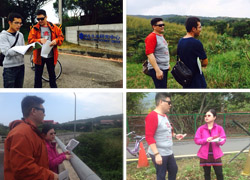Archilife Agriculture & Provisions Team Meeting
|
祐生農糧小組會議 氣候變遷速度、規模已加劇,末日四騎士(饑荒、疫病、民變、戰爭)已然現身,台灣雖處於相對安全區域,但已無法迴避輸入型災難,尤其是疫病傳染與糧食匱乏。因此,本會特於生活特組之下,再行召集疫病、農糧小組,分別就饑疫災難可能引發之議題進行研討,並以祐生生活研究中心及周圍區域為範疇,規劃相關的因應措施。其中,農糧小組組長為張顥嚴先生;組員包括:張秀燕小姐、林晏宇小姐、王子明先生等,自2014年四月份起,陸續召開會議進行討論。茲將各階段研討成果說明如下: With rapid and exacerbated climate change, the Four Horsemen of the Apocalypse (Famine, Pestilence, Death and War) have emerged. Although Taiwan is situated in a relatively safe region, imported disasters cannot be averted, especially the spread of epidemic diseases and food shortages. Consequently, Archilife has assembled the Epidemic Disease Team and Agriculture & Provisions Team under the Archilife Living Special Team to discuss possible issues that may be induced by famine and pestilence. Furthermore,using Archilife Living Research Center and the surrounding areas as the boundary, relevant contingency measures are devised. In particular, the team leader of the Agriculture & Provisions Team is Mr. Chang Hao-yen, with team members including Ms. Chang Hsiu-yen, Lin Yen-yu and Mr. Wang Tzu-ming etc. As of April 2014, several meetings had been convened to conduct discussions, and the outcome is summarized below:  自2014年4月6日起至2014年6月20日止,共計召開九次會議,分別就下列議題進行研討並提出對應策略。關於氣候變遷下,全球糧食供給的波動與台灣本土農作與輸入糧食可能受到的影響之議題,該組認為氣候變遷對全球糧食生產的衝擊可以預期,然對台灣不至於有毀滅性的影響,短期內可觀察到的影響,主要為作物品質下降與田間病蟲害管理困難度增高。關於規劃以祐生生活研究中心與附近區域為農作栽種區,提出食用與食療之農作物物種、栽種時節、數量、區域等具體操作方案之議題,該組檢測祐生生活研究中心與附近區域土壤性質,並估算可栽種作物的土地面積後,分別就栽種作物的種類、種原庫的建立方式、選種、育種的原則、作物的栽培方法、採收後作物的利用與儲存方式等,提出對應的規劃。惟該組未考量面對氣候變遷,野菜應較傳統作物更具應變與調適能力,由於缺乏野菜這個部分的討論,經本會提示後,該組再度召開會議進行研討,依據傳統作物與野菜各占百分之五十的配比原則,修正作物栽種規劃內容。 自2014年4月6日起至2014年6月20日止,共計召開九次會議,分別就下列議題進行研討並提出對應策略。關於氣候變遷下,全球糧食供給的波動與台灣本土農作與輸入糧食可能受到的影響之議題,該組認為氣候變遷對全球糧食生產的衝擊可以預期,然對台灣不至於有毀滅性的影響,短期內可觀察到的影響,主要為作物品質下降與田間病蟲害管理困難度增高。關於規劃以祐生生活研究中心與附近區域為農作栽種區,提出食用與食療之農作物物種、栽種時節、數量、區域等具體操作方案之議題,該組檢測祐生生活研究中心與附近區域土壤性質,並估算可栽種作物的土地面積後,分別就栽種作物的種類、種原庫的建立方式、選種、育種的原則、作物的栽培方法、採收後作物的利用與儲存方式等,提出對應的規劃。惟該組未考量面對氣候變遷,野菜應較傳統作物更具應變與調適能力,由於缺乏野菜這個部分的討論,經本會提示後,該組再度召開會議進行研討,依據傳統作物與野菜各占百分之五十的配比原則,修正作物栽種規劃內容。Between April 6 and June 20, 2014, 9 meetings were convened to discuss the following agendas and propose appropriate response strategies. Under the influence of climate change, fluctuations in the global food supply as well as the impact on domestic agriculture in Taiwan and imported food are among the topics of discussion. The team believes that the impact of climate change on global food production is expected, but it will not have catastrophic effects on Taiwan. The observable influences in the short-term include decreased quality of crops and increased difficulty in pest control in the field. As for setting aside the Archilife Living Research Center and nearby areas as crop cultivation regions, the team proposed edible and food therapy crops as well as concrete operating procedures such as their cultivation season, quantity and region etc. The team started by analyzing the properties of soils at the Archilife Living Research Center and nearby areas in order to calculate the cultivatable surface area before proposing relevant plans in accordance with the crop species, germplasm database, seed selection, breeding principles, cultivation technique as well as crop utilization and storage after harvesting etc. However, the team did not take into consideration that edible wild plants are more adaptable to climate change than traditional crops; therefore, after reminder from Archilife, the team once again convened another meeting to conduct discussions on edible wild plants. Based on the ratio of 50:50 between traditional crops and edible wild plants, the crop cultivation plan was amended.  自2014年8月6日起至2014年9月17日止,共計召開七次會議,該組除持續關注並提出氣候變遷下,田間病蟲害的防治策略外,特別針對祐生生活研究中心與附近區域,可供野菜栽種的區域進行實地踏勘,逐一分析當地各種野菜的特徵、療效並評估食用風險後,提出野菜栽種規劃,最後並綜整兩個階段的研究成果,完成種植曆的編訂。本會期盼農糧小組,未來能夠持續關注氣候變遷衍生的糧食問題,思索、研擬對應的解決方案,以確保人類族群的永續生機。 自2014年8月6日起至2014年9月17日止,共計召開七次會議,該組除持續關注並提出氣候變遷下,田間病蟲害的防治策略外,特別針對祐生生活研究中心與附近區域,可供野菜栽種的區域進行實地踏勘,逐一分析當地各種野菜的特徵、療效並評估食用風險後,提出野菜栽種規劃,最後並綜整兩個階段的研究成果,完成種植曆的編訂。本會期盼農糧小組,未來能夠持續關注氣候變遷衍生的糧食問題,思索、研擬對應的解決方案,以確保人類族群的永續生機。Between August 6 and September 17, 2014, 7 meetings were convened. Besides monitoring climate change and proposing pest control strategies under climate change, on-site investigation was conducted at areas in Archilife Living Research Center and nearby areas that are suitable for wild plant cultivation to propose a cultivation plan by analyzing the attributes, therapeutic effects and risks of various local wild plants. Finally, the outcomes of the two-stage research are consolidated to compile the cultivation calendar. Archilife expects the Agriculture & Provisions Team to continue monitoring food problems caused by climate change in the future in order to contemplate and devise corresponding solutions to ensure the sustainability of people. |

